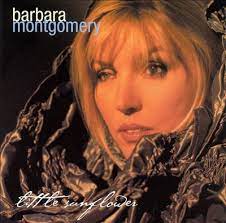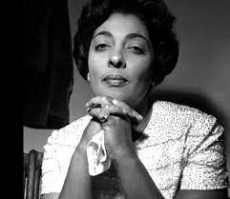
Daily Dose Of Jazz…
Dee Bell was born in Fort Wayne, Indiana on July 16, 1950 and grew up in a musical family and began playing music at home. She played clarinet in the Plainfield High School band and performed in an a cappella trio from age ten through her last year of high school. She went on to enroll and graduate from Indiana University in 1972, lived on the edge of the Hoosier National Forest in a two-room cabin with a wood stove for heat, and was co-founder and head chef of the Earth Kitchen vegetarian restaurant in Bloomington, Indiana.
The late 1970s saw Bell moving to California and working at a restaurant in Sausalito. While singing Happy Birthday to a customer, she was heard by jazz guitarist Eddie Duran who invited her to sing with his band. They made a demo tape which became her first album, Let There Be Love on the Concord Jazz label, that included saxophonist Stan Getz. Their sophomore album for Concord Jazz brought in trumpeter Tom Harrell.
Bell recorded a third album, Sagacious Grace in 1990 with Houston Person and John Stowell, but was never released due to technical problems until 2011 when audio engineers fixed the problem. It reached No. 31 on the JazzWeek radio chart.
Bell left the music business and became a grade school music teacher in Mill Valley. After the death of her musical director, Al Plank, she met Marcos Silva backstage at a tribute to Merrilee Trost. This became a collaboration, merging her swing style with his Brazilian rhythms, resulting in the recording of three CDs by them.
With permission and copyrights Bell has written lyrics to Billy Strayhorn’s Isfahan, Jimmy Rowles The Peacocks, Don Sebesky’s You Can’t Go Home Again, and Ivan Lins’ Acaso (By Chance), Depois dos Temporais (After the Storm), and Choros das Aguas (Crying of the Waters).
Vocalist Dee Bell, who has released six albums and has been nominated for several awards by Down Beat, Billboard and BAM, continues to perform.
More Posts: bandleader,history,instrumental,jazz,lyricist,music,vocal

Daily Dose Of Jazz…
Corky Hale was born Merrilyn Hecht on July 3, 1936 in Freeport, Illinois. She learned piano, harp, flute, and cello by the time she was in her teens. She went on to study at the Chicago Music Conservatory and then at Interlochen Center for the Arts in Michigan.
By age 16 she had enrolled in Stephens College, a school for young ladies, for her last year of high school. After graduation she decided to move to Hollywood, California to be a musician but her father had other plans, sending her to nearby University of Wisconsin–Madison. After a year she dropped out, intent on moving to Hollywood but again a compromise with her parents led her to UCLA.
During the 1950s, she became a studio musician in Hollywood, playing harp on albums by Chet Baker, June Christy, Ella Fitzgerald, Anita O’Day, and Frank Sinatra. She worked as a vocalist with Freddy Martin at the Coconut Grove in Los Angeles, California. Jerry Gray invited her to perform with his band in Las Vegas, Nevada where she played piano for Billie Holiday and accompanied her on tour.
As a solo act, she recorded the album Corky Hale Plays George Gershwin and Vernon Duke with Buddy Collette, Howard Roberts, and Chico Hamilton. The late Sixties saw her accompany Tony Bennett on The Tonight Show Starring Johnny Carson and sang a song by herself.
She has worked with Liberace, Barbra Streisand, Elkie Brooks, Harry James, Peggy Lee, James Brown, Spike Jones, George Michael, Roberta Flack, Les McCann, Herbie Mann, Nina Simone and Björk, to name a few. Hale has also produced plays, including Give ‘Em Hell, Harry, starring Jason Alexander and Lullaby of Broadway, a profile of the lyricist Al Dubin. She has appeared at Vibrato, Catalina Bar & Grill, The White House, and the Kennedy Center.
At the University of Wisconsin, Hale was one of the few white students to join the NAACP. She was a birth control teacher at Planned Parenthood in New York and is on the National Advisory Board of NARAL and on the board of WRRAP. She is an American Film Institute associate and is the founder of Angel Harvest, an organization which redistributes unused food from restaurants, hotels, and events to hungry and needy people in Los Angeles.
Harpist, pianist, flutist, and vocalist Corky Hale, who recorded four albums as a leader and has been a theater producer, political activist, restaurateur, and is the owner of the Corky Hale Women’s Clothing Store in Los Angeles.
More Posts: bandleader,flute,harp,history,instrumental,jazz,music,piano,vocal

Daily Dose Of Jazz…
Barbara Montgomery ws born in San Francisco, California on June 30, 1948 and during her teen years lived in Vietnam in the early to mid Sixties because her father’s work as an electrical engineer took them there. In the late 1960s she moved to her adopted home of Philadelphia, Pennsylvania and during this period is when she started singing.
In the early to mid-’70s, Montgomery’s day gig was The Mike Douglas Show, for which she performed a variety of duties including makeup artist, camera person, and stage manager. When the popular television program moved from Philadelphia to Los Angeles, California she chose to stay and ultimately went on tour with pop/folk singer Harry Chapin later in the decade, helping with lighting and doing some background vocals. Becoming a full time mother in 1979, she took a break from music for several years.
Since 1986, she has served as musical director for fitness expert Richard Simmons. Between the demands of working for Simmons and raising a child, Barbara had little time for jazz singing in the 1980s. But she returned to club gigs in 1992 and acquired a small following playing the Philadelphia jazz circuit, where she has been joined by such notables as guitarist Jimmy Bruno and pianists Sid Simmons, Barry Sames, and Dennis Fortune.
Montgomery recruited former Chick Corea drummer Dave Weckl and co-producer/guitarist Michael Sembello for her self-titled debut album in 1996. Two years later she released her sophomore LP, Ask Me Now and her third Dakini Land followed after three more years, in tribute to the work of Chick Corea. This release won her much praise and put her on the scene as a vocalist to follow. That reputation was helped by Little Sunflower, the following year’s record of standards.
Vocalist Barbara Montgomery, who was influenced by Chris Connor, Julie London, and June Christy, continues to perform and record.
More Posts: bandleader,history,instrumental,jazz,music,vocal

Three Wishes
Girl talk always ensued when Pannonica and Carmen McRae were together and when she wanted to know what her friend would say asked her what her three wishes would be and she told her:
- “I wish that we had more people that appreciated good American music.”
- “I wish my father were alive – it’s in the wrong order! That should come first.”
- “And the other one… I hope that I’ll know when I’ve had it.”
*Excerpt from Three Wishes: An Intimate Look at Jazz Greats ~ Compiled and Photographed by Pannonica de Koenigswarter
More Posts: baroness,history,instrumental,jazz,music,pannonica,three,vocal,wishes

Daily Dose Of Jazz…
Maria Jeanette Lindström was born on May 29, 1971 in Stockholm, Sweden and grew up in Östersund and Ås in the Jämtland region of Sweden. She made her recording debut for Caprice Records with Another Country in 1995, which earned her the Jazz in Sweden prize. Two more albums followed for the same label.
In 2003 Jeanette began a collaboration with the Bonnier Amigo Music Group on the album Walk. The album and its sequel, In the Middle of This Riddle, were warmly received by audiences and critics in Sweden and abroad. She recorded a side project album Whistling Away the Dark with Palle Danielsson, Bobo Stenson, Jonas Östholm, and Magnus Öström.
In 2007 the song Leaf, from In the Middle of This Riddle, was remixed by King Britt, a DJ and record producer from Philadelphia, and a track from the album was chosen for Volume 7 of the compilation series Saint-Germain-des-Prés Café. Her album Attitude & Orbit Control was released in 2009 and she received a Swedish Grammis at the awards ceremony the following year.
She has worked with pianist Steve Dobrogosz and the group ONCE with bassist Anders Jormin. She has appeared as guest soloist in small groups, big bands, and chamber and symphony orchestras.
Vocalist, composer and lyricist Jeanette Lindström continues to tour worldwide and explore the endless realms of jazz.
More Posts: bandleader,history,instrumental,jazz,music,vocal




